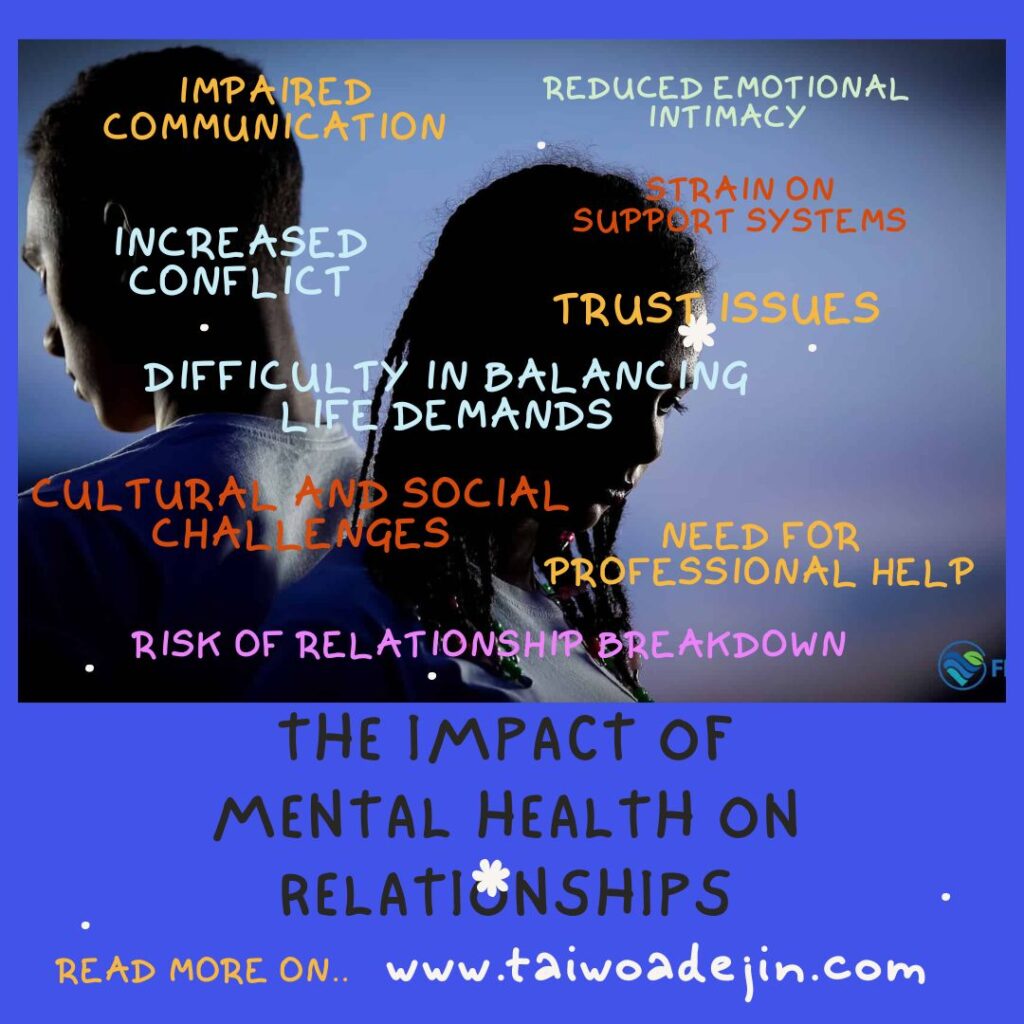
Mental health plays a crucial role in the quality and longevity of relationships. While often overshadowed by more visible issues like financial struggles or communication breakdowns, mental health can be the underlying factor that influences these challenges.
Understanding the impact of mental health on relationships is essential for both individuals and couples seeking to build and maintain healthy, fulfilling partnerships.
The Connection Between Mental Health and Relationship Dynamics
Mental health significantly affects how individuals interact with their partners. When one or both partners struggle with mental health issues, such as anxiety, depression, or stress, it can lead to misunderstandings, conflicts, and emotional distance. Mental health challenges can also affect self-esteem, communication, and the ability to trust, all of which are foundational to a strong relationship.
- Communication and Conflict Resolution
- Mental health issues can impair effective communication, which is vital for resolving conflicts. For example, someone with depression may withdraw from conversations, making it difficult to address issues head-on. On the other hand, anxiety can lead to overthinking and misinterpretations, escalating minor disagreements into major conflicts.
- Implementing effective conflict resolution strategies can help couples navigate these challenges. Techniques such as active listening, validating each other’s feelings, and seeking professional help when necessary can make a significant difference.
- Emotional Intimacy and Connection
- Emotional intimacy is the cornerstone of a healthy relationship, but it can be severely impacted by mental health issues. Depression, for example, often leads to emotional numbness, making it difficult to maintain the deep connections that are crucial for a relationship’s success. Similarly, anxiety can cause excessive worry and fear, creating barriers to vulnerability and trust.
- Maintaining emotional intimacy in the face of mental health challenges requires a proactive approach. This might include regular check-ins with each other, open conversations about feelings, and engaging in activities that foster closeness and bonding.
The Role of Trust and Support in Relationships
Trust is a fundamental element of any successful relationship, and mental health can directly impact it. When one partner struggles with mental health, the other partner may feel overwhelmed, leading to a breakdown in trust and communication.
- Building and Rebuilding Trust
- Trust can be built and rebuilt even in the face of mental health challenges. Building trust in relationships involves being honest about one’s mental health struggles and working together to find solutions. Couples can benefit from setting clear boundaries, being patient with each other, and seeking professional help, such as therapy or counseling, to work through trust issues.
- In cases where trust has been damaged, such as after an episode of infidelity or a prolonged period of emotional distance, rebuilding trust requires a commitment to open communication and a willingness to address underlying mental health issues.
- Support Systems and External Help
- A strong support system is vital for maintaining mental health and, by extension, the health of the relationship. Couples should not hesitate to seek external help, such as marriage counseling success stories that offer hope and strategies for overcoming challenges.
- Therapy can provide a safe space for couples to explore their feelings, understand each other’s mental health struggles, and develop strategies for supporting each other through difficult times.
Balancing Mental Health with Other Life Demands
In today’s fast-paced world, balancing mental health with other life demands, such as work and family, can be particularly challenging. Stress from work, financial pressures, and the demands of family life can exacerbate mental health issues, putting additional strain on relationships.
- Work-Life Balance
- Balancing work and family life is essential for maintaining both mental health and relationship satisfaction. Couples can achieve this balance by setting priorities, creating schedules that allow for quality time together, and supporting each other’s professional and personal goals.
- It’s also important for couples to recognize the signs of burnout and take steps to manage stress before it affects their relationship. This might include taking regular breaks, practicing mindfulness, and ensuring that both partners have time for self-care.
- Cultural and Social Factors
- Mental health is also influenced by cultural and social factors, which can affect relationships in various ways. Navigating cultural differences in marriage, for example, requires understanding and respecting each other’s backgrounds and finding common ground where possible.
- Couples should be mindful of how cultural expectations and societal pressures can impact mental health and relationships. Open dialogue and mutual respect are key to overcoming these challenges.
Conclusion
Mental health is a critical factor in the success of any relationship. By recognizing the impact of mental health on communication, emotional intimacy, trust, and the ability to balance life’s demands, couples can take proactive steps to support each other and strengthen their relationship. Whether through effective conflict resolution strategies, building trust, or seeking professional help, addressing mental health issues is essential for maintaining a healthy, fulfilling partnership.
Incorporating healthy relationship tips and being mindful of the influence of mental health can make a significant difference in the quality and longevity of relationships.
By prioritizing mental well-being, couples can build stronger, more resilient relationships that can withstand the challenges of life.
Thank you for reading.
Kindly comment, share and like!
Share this content:





